Getting a good night’s sleep is essential for our overall health and well-being. It not only rejuvenates our bodies but also allows our brains to process and consolidate information from the day.
However, various factors can disrupt our sleeping routines, leading to poor quality sleep and daytime drowsiness. One such factor is DEPY, which stands for Digital Electronic Personal Yawning. In this article, we will explore how DEPY affects your sleeping routines and share some tips on how to minimize its impact.
What is DEPY?
DEPY refers to the use of digital electronic devices such as smartphones, tablets, computers, and televisions, particularly before bedtime. With the advancement of technology, these devices have become an integral part of our daily lives.
Whether it’s checking social media notifications, watching videos, or playing games, we often find ourselves engaged with these devices even when we should be winding down for sleep.
The Impact of DEPY on Sleep Patterns
Using DEPY before bedtime can significantly disrupt our sleep patterns. The main culprits are the blue light emitted by these devices and the engaging content they provide. Here’s how DEPY affects different aspects of our sleep:.
1. Delayed Melatonin Production
Melatonin is a hormone that regulates our sleep-wake cycles. Exposure to blue light from DEPY devices suppresses melatonin production, making it harder to fall asleep.
This delay affects the natural release of melatonin and can lead to insomnia or disrupted sleep throughout the night.
2. Reduced Rapid Eye Movement (REM) Sleep
REM sleep is a crucial phase of sleep associated with memory consolidation, learning, and overall cognitive function. DEPY can reduce the amount of REM sleep we get, leaving us feeling groggy, unfocused, and mentally fatigued the next day.
3. Increased Alertness and Suppressed Sleepiness
Engaging with stimulating content on digital devices keeps our brains active and alert, making it difficult to feel drowsy or fall asleep.
The constant exposure to exciting or stressful information from social media or other sources increases our alertness and suppresses natural sleepiness.
4. Disruption of Circadian Rhythm
Our circadian rhythm, often referred to as our “body clock,” regulates our sleep-wake cycles.
The blue light from DEPY devices can disrupt this rhythm by interfering with the release of sleep-inducing hormones and confusing our internal clocks. This disruption can lead to irregular sleep patterns and difficulty in maintaining a consistent sleep schedule.
5. Increased Sleep Onset Latency
Sleep onset latency refers to the time it takes for a person to fall asleep after getting into bed. DEPY can increase sleep onset latency by overstimulating the brain and delaying the natural transition from wakefulness to sleep.
This can result in frustration, anxiety, and a longer time spent tossing and turning before drifting off to sleep.
Tips for Minimizing DEPY’s Impact
While avoiding DEPY entirely before bedtime might be challenging in today’s digital age, there are steps you can take to minimize its impact on your sleeping routines:.
1. Establish a Digital Curfew
Set a specific time at least one hour before bedtime when you will disconnect from all DEPY devices. This curfew allows your brain to wind down and prepare for sleep.
Use this time to engage in relaxing activities such as reading a book, listening to calming music, or practicing meditation.
2. Use Blue Light Filters
Enable the blue light filter on your devices or use specialized applications that reduce the amount of blue light emitted. These filters can help promote melatonin production and make it easier to fall asleep.
Consider investing in blue light-blocking glasses if you frequently use DEPY devices in the evening.
3. Create a Sleep-Friendly Environment
Make your bedroom a sleep-friendly sanctuary. Keep it cool, dark, and quiet to create optimal conditions for quality sleep. Remove all DEPY devices from the bedroom or ensure they are turned off and out of sight.
Use curtains or blinds to block out any external light that can interfere with your sleep.
4. Practice Relaxation Techniques
Engage in relaxation techniques before bedtime to calm your mind and prepare your body for sleep. Deep breathing exercises, progressive muscle relaxation, and guided imagery can help reduce stress and promote relaxation.
Incorporate these techniques into your bedtime routine to signal to your body that it’s time to unwind.
5. Limit DEPY Usage during the Evening
Try to limit your DEPY usage during the evening hours, especially right before bedtime. Instead, engage in activities that promote relaxation and don’t involve screens. Spend time with loved ones, engage in hobbies, or enjoy a warm bath.
By reducing DEPY exposure, you allow your brain to produce the necessary melatonin for a restful night’s sleep.
Conclusion
DEPY, or the use of digital electronic devices before bedtime, can have a significant impact on your sleeping routines. From delaying melatonin production to disrupting your circadian rhythm, DEPY can lead to poor quality sleep and daytime drowsiness.
However, by following the tips provided, you can minimize the adverse effects of DEPY and improve your sleep hygiene. Remember, a good night’s sleep is essential for your overall health and well-being.





























